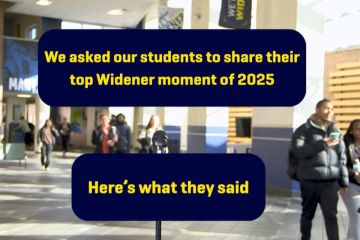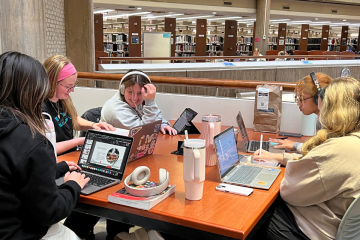Widener Teacher Candidates Help Elementary Student “Scientists” Shine at Virtual STEM Fair

A group of scientists gathers virtually to share their latest inventions in machine technology and to make investigative reports on the conditions necessary for life. It’s a rare feat to have so many bright minds gathered for one event, but for the students in Ms. Shelby’s first-grade class and Ms. Isabella’s second-grade class, they are scientists through and through, committed to learning and excited to share what they know at the annual Stetser Elementary STEM fair.
“My students dove right into their roles as scientists. Throughout the unit their responses were so articulate and smart and creative,” Shelby Schoffstall, a senior elementary education: the early years and special education major, said. “They were so engaged and would ask ‘are we doing science yet?!’”
Schoffstall’s class presentation during the virtual STEM fair is part of the rich tradition of the Community Engaged Teacher Education (CETE) program that all teacher candidates seeking elementary and special education certifications are required to complete. CETE places teacher candidates in a local classroom and pairs them with community mentors in the city of Chester to develop culturally relevant lesson plans and help teachers close the opportunity gap for students in diverse urban settings.
Teacher candidates in their senior year at Widener spend two hours every day in the fall semester working in their assigned classrooms. The week before Thanksgiving they spend all day with their students, teaching a five-lesson unit on their specified science topic. That week of learning culminates in a celebratory event where Widener professors, community mentors, and other Stetser students gather to share and learn from each other. This year, because of Covid-19, the entire process was conducted remotely.
Nadine McHenry, professor of education and coordinator of the CETE program, and Janet Baldwin, retired principal of Stetser Elementary and current adjunct professor working in the CETE program, say they were intimidated at first by the prospect of moving such a large event to a virtual format.
“When you enter remote learning you think ‘Oh my gosh, how are we going to reshape everything?’ It impacted the entire program, but Dr. McHenry has been a powerhouse in terms of looking at possibilities and not letting go,” Baldwin said. “The challenge was to demonstrate to ourselves that barriers are there to be navigated and while many people have low expectations for remote learning in under-resourced communities, low expectations are not acceptable at all to us.”
Learn more about elementary education at Widener
McHenry added, “Even though we were online, we still believe in our teacher candidates and we still believe in the capacity of the students. We really wanted them to share what they learned.”
To teacher candidates who have agility and adaptability ingrained into all their coursework, moving to a virtual event was hardly an issue.
“One of the biggest things we’re told from the jump, and we’re told every semester, is to be flexible,” Schoffstall said. “That’s just something you’re going to have to deal with throughout your entire career, so this was a good learning experience in teaching us to be adaptive and go with the flow of it.”
Taking Care
Senior teacher candidate Isabella Hamlin was recruited to play basketball for The Pride and began her college career as a nursing major. She switched to education in her sophomore year, fulfilling a childhood dream to be a teacher.
I realized the whole point of what I wanted to do was take care of people. When I found nursing wasn’t for me and tried out education, I immediately fell in love. - Senior Isabella Hamlin
Hamlin chose to focus on machines and engineering for her science unit after noticing her students were particularly interested in robots. In her science fair presentation, which combines footage from her classroom science unit lessons with live sharing from her young scientists, the joy her students have for science is clear. From the invention of the Color Changer Backpack 2000—able to change the color of any object to your favorite color—to Lightning Boy—a waterproof robot able to both turn on the lights in the scary darkness and help out with homework—creativity burst from Hamlin’s students.
“Since we’re all at home I didn’t know what materials my students had so I gave them the opportunity to draw their machines or build them out of Legos or otherwise craft them. I was nervous they were all going to come up with similar things because we brainstormed during class, but they were all so creative. I was blown away,” she said.
Hamlin, who is eager to teach in an urban setting when she graduates, notes that the STEM fair and CETE program have opened her eyes to what it means to be a teacher taking care of their community.
“Coming into teaching I didn’t really consider community involvement, and I definitely didn’t know how I would do that, but now as I’m nearing the end of my college career, I’m so glad we had the CETE program to know how important it is to learn about the community you’re teaching in,” she said. “No matter what your major is, I think you should look to get more involved in your community, especially if that community could use your help.”
This is exactly the knowledge the CETE program seeks to impart to teacher candidates.
“No matter where you teach, if you’re in an urban environment, a rural environment, a remote village in Alaska, whatever it is, you need to learn about your community and you need to know about their lives and life experiences so that you don’t project any judgment, but rather understand what your students experience,” McHenry said.
The virtual STEM fair was not a setting for basics or paring things down at all, Baldwin concluded, but a tremendous opportunity to show what the possibilities and capabilities of students and teachers alike are.
Thanks to teachers like Ms. Shelby and Ms. Isabella, it doesn’t look like Lightning Boy will need to help much with science homework anytime soon.



